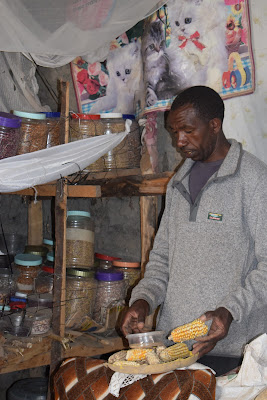In the face of poor harvests from frequent drought, women in Gilgil turn to indigenous knowledge on seed saving for food security, and it comes with reduction of intimate partner violence, reports FELISTA WANGARI
Ms Wangui and her family were forced out of their home in Molo in December 2007, following the violence that erupted in light of the contested presidential election result. They initially sought refuge in Gilgil, before settling in Langalanga in 2012. There, the smallholder farmer family figured that farming would not be part of their new life.
“We bought the land we could find (and afford) at the time. We didn't have the luxury of being choosy, but the land was so rocky, I didn’t think anything could grow out of it,” says Ms Wangui, who is now a vegetable farmer in Langalanga, Nakuru County.
Back then Ms Wangui got by as a casual labourer on other people’s farms, until she learnt about dryland farming techniques from a local community group, which was being trained by Seed Savers Network, a Nakuru-based organisation that trains small-holder farmers to improve the productivity of their farms for food security.
“I learnt that crops could grow anywhere, even on rocky ground, and learnt that I didn’t have to worry about seeds,” she says
With rains comes conflict
|
 |
| John Wainaina at his home in Gilgil, where he hosts the community seed bank for members of the 20 -member Kikopey Seed Banking Self-help Group, 16 0f whom are women. Photo | Felista Wangari |
Mitigation strategyTo get
around the lack of seeds and money to buy them, women would seek work on other
people’s farms to raise money for seeds, but that would affect their ability to
use early planting as a climate adaptation strategy. “The rainy season is projected to start in the third and fourth week of March, but that was preceded by drought. This means people don’t have money because they didn’t harvest in the previous season. If it rains now and you don’t have seeds, you have to first work for those with money, so that you can get money to buy seeds. By the time you get to working on your own farm, the rain has subsided. When you have seeds, that is no longer a challenge,” says John Wainaina, who leads the Kikopey Seed Saving Self-Help Group in Gilgil. Seed saving has been a game
changer.
“We have seen transformation with the women when they are able to save seeds. They say that there are no more fights and quarrels because they are not asking anyone for money, and they have food. From this position, they have a voice at the table, respect and some independence. Giving a woman her own means of getting food doesn’t rely on another person is transformative,” says Ms Kamau, the gender officer at Seed Savers Network. Ms Wangui, who shakes her head in disbelief when she recalls her journey from 2007 to this point, no longer has to worry about where the seeds or money to buy them will come from once the rains begin. She can also plant the seed varieties of her choice. “When you start saving seeds and adopt better farming techniques, you don’t have to ask for money to buy seeds, salt or to go out and about because every day someone is buying your produce. You stop being a borrower because you now have your own seeds,” says Ms Wangui. Eunice Wainaina, a teacher who practises farming with her husband Mr Wainaina of Kikopey Seed Savers Self-help Group, has 90 kilogrammes of bean seeds of various varieties in the seed bank -- enough to plant on nearly five acres. She says that having seeds in the seed bank means that she can plant early, which is one of the recommended climate adaptation strategies to minimise instances of failed crops. In addition to seed saving and early planting, her family uses permaculture to conserve moisture in the soil and help the crops grow long after the rains have subsided. |


No comments:
Post a Comment